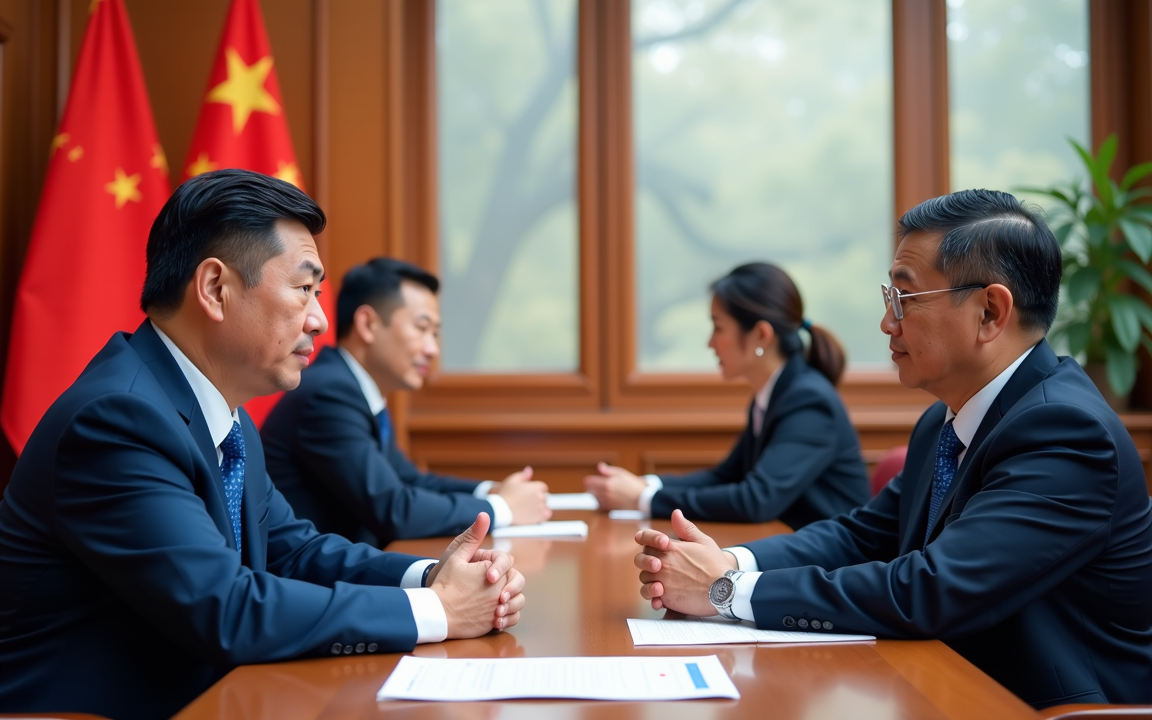
Facing mounting economic pressure from its protracted trade war with the United States, China has unveiled a significant package of stimulus measures aimed at shoring up its domestic economy.
This flurry of policy action comes just as Beijing and Washington confirmed plans for high-level trade talks later this week, offering a tentative sign of potential de-escalation.
Top Chinese financial officials, including the governor of the People’s Bank of China (PBOC), detailed a series of steps designed to inject liquidity and support growth.
Key among these are cuts to interest rates and a reduction in the reserve requirement ratio for banks, a move intended to free up substantial funds for lending.
Specifically, PBOC Governor Pan Gongsheng announced a reduction in the reverse repo rate (the rate on commercial banks’ central bank deposits) to 1.4% from 1.5%, and a 0.25 percentage point cut in the PBOC’s lending rate to commercial banks, bringing it to 1.5%.
Crucially, the required reserve ratio for banks was lowered by 0.5%.
Governor Pan estimated this measure alone would “free up 1 trillion yuan ($137.6 billion) in extra cash” for the banking system to deploy.
Additionally, the central bank reduced interest rates on five-year housing loans, aiming to support the beleaguered property sector.
Beyond these monetary policy adjustments, the government also pledged to increase funding available for factory upgrades, technological innovation, and service sector businesses like elder care.
Navigating trade war headwinds
These domestic support measures are a clear response to the significant economic toll exacted by the high tariffs imposed by US President Donald Trump.
China’s export-reliant economy, already grappling with a prolonged downturn in its crucial property market, has been further strained by these trade barriers.
The announcement of these economic boosters coincided with news that high-level trade talks are set to resume.
Treasury Secretary Scott Bessent and US Trade Representative Jamieson Greer are scheduled to meet with Chinese Vice Premier He Lifeng in Geneva, Switzerland, later this week.
This will be the first confirmed dialogue since the latest round of significant tariff escalations.
Cautious optimism greets dialogue
While the agreement to talk offers a glimmer of hope, both sides have maintained firm public stances on their respective tariff positions, leading to cautious market reactions.
“The talks ‘could be the pivot point that either locks in fragile confidence or re-ignites the ‘trade war’ inferno,’” warned Stephen Innes of SPI Asset Management in a report, highlighting the high stakes involved.
Recent economic data underscores the strain on both economies.
The US economy contracted by 0.3% in the first quarter of 2025.
While China reported 5.4% annual growth in Q1, driven by factories ramping up production to meet a pre-tariff spike in orders, economists have questioned the sustainability of this momentum, and more recent indicators show deteriorating new export orders and business sentiment.
Financial markets, which have been reeling from the standoff characterized by US tariffs as high as 145% on Chinese goods and Chinese retaliatory hikes up to 125%, reacted positively but with restraint to the dual news of stimulus and talks.
Share prices in Hong Kong rose over 2%, and Shanghai gained 0.5% in early Wednesday trading, with US futures also advancing.
However, market watchers anticipate a protracted resolution process. “We do not expect reaction to be euphoric,” commented Tan Jing Yi of Mizuho Bank, as quoted by Reuters.
Point being, any trade resolution would likely take a long time and in the near term, there may be some piecemeal exemptions or tariff reductions on certain goods.
The combination of domestic stimulus and renewed dialogue signals Beijing’s attempt to navigate the challenging economic landscape created by the ongoing trade conflict.
The post Rate cuts, reserve ratio slashed: China acts to bolster economy ahead of US talks appeared first on Invezz

